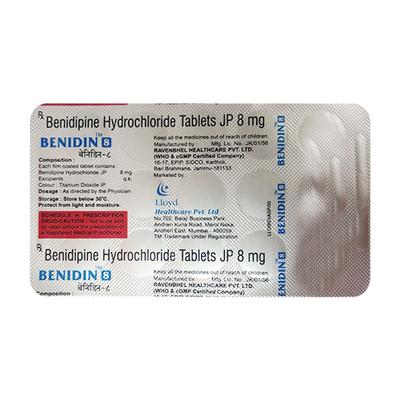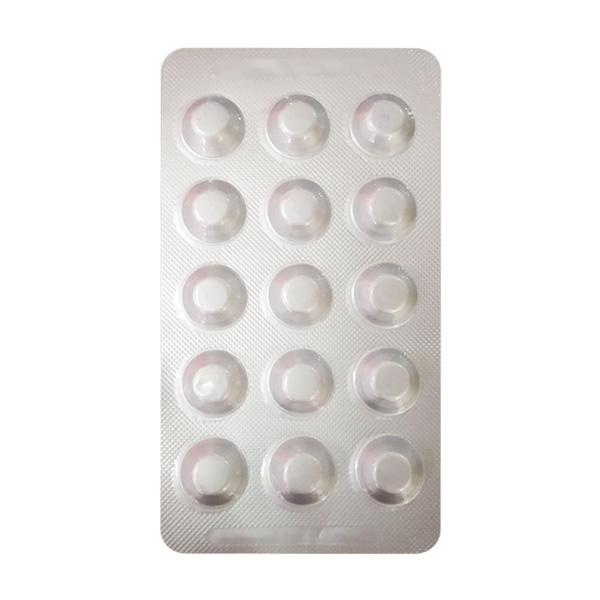

Netmeds First Membership
Quick Links
Introduction About BENIDIN 8 TABLET
BENIDIN 8 TABLET contains Benidipine which belongs to the group of medicines called Calcium channel blockers. It is used to manage hypertension. Hypertension (also known as high blood pressure) is a medical condition in which the force of the blood exerted against the walls of the artery remains very high, and as a result it may lead to severe damage to the blood vessels supplying several organs such as heart, kidney, or brain, thus causing heart attack, heart failure, kidney failure, stroke, or even blindness.
BENIDIN 8 TABLET can also be used to manage renal parenchymal hypertension (high blood pressure in the kidneys caused due to kidney problems) and angina pectoris. Angina pectoris is a sudden, sharp, and severe chest pain that originates from the apex of the heart and radiates to the left shoulder. It can be characterized by the presence of severe and crushing pain along with a feeling of pressure and suffocation, especially behind the breastbone.
Benidipine works by relaxing the blood vessels supplying the heart. It improves blood flow and oxygen supply to the heart, which therefore reduces pressure on the heart and makes it easier for the heart to pump blood throughout the body. It also exerts protective effects on the kidney cells by reducing the blood pressure within the kidneys.
Before taking BENIDIN 8 TABLET inform your doctor if you have any liver problems or heart problems (such as severe low blood pressure or cardiac shock). Avoid drinking grapefruit juice while taking BENIDIN 8 TABLET as it may further decrease your blood pressure. Before taking BENIDIN 8 TABLET, inform your doctor if you are pregnant or breast-feeding. The most common side effects of taking BENIDIN 8 TABLET are rapid heartbeat, headache, and dizziness. Consult your doctor if any of these side effect worsens.
Uses Of BENIDIN 8 TABLET
- Manage hypertension (high blood pressure)
- Manage and manages chest pain associated with angina pectoris
- Manage renal parenchymal hypertension
How BENIDIN 8 TABLET Works
BENIDIN 8 TABLET reduces blood pressure and chest pain, where benidipine acts by relaxing the blood vessels supplying the heart. As a result, it improves blood flow to the heart which therefore reduces the pressure on the heart, thus making it easier for the heart to pump blood throughout the body. It also improves oxygen supply to the heart, which therefore reduces ischemic symptoms (such as chest pain and heaviness) associated with angina. Benidipine can also relax the blood vessels supplying the kidneys which therefore reduces pressure within the kidneys and manages further kidney damage.
How to use BENIDIN 8 TABLET
Take BENIDIN 8 TABLET as advised by your physician. Swallow the medicine with a glass of water. Do not crush or chew the medicine. Take BENIDIN 8 TABLET preferably after meals. Your doctor will decide the correct dose and duration of therapy for you depending upon your age, body weight and disease condition. Do not stop taking BENIDIN 8 TABLET unless your doctor advice you to stop.
Side Effects Of BENIDIN 8 TABLET
Common
- fast heartbeat
- dizziness, headache
- skin rash and itching
- sensitivity to sunlight
- gynecomastia (enlargement of breast in men)
Rare
Stop taking BENIDIN 8 TABLET and contact your doctor immediately if you experience any of the following side effects:
- signs of liver problems (such as generalized tiredness, weakness, yellowish discolouration of the skin and the whites of the eyes accompanied with loss of appetite)
How To Manage Side Effects
Headache:
Rest and relax. Drink plenty of fluids such as water or electrolytes. Apply a pain-relieving balm on the head if required. Do not consume too much of alcohol. Reduce looking into bright light and try to get adequate sleep. Consult your doctor if your headache worsens.
Dizziness:
Try to rest and relax. Get enough sleep. Lie down or sit immediately if you feel dizzy. Avoid driving or operating any heavy tools or machines while you are feeling dizzy. Do not consume too much of alcohol, as it could aggravate your dizziness. Consult your doctor if you continue to feel dizzy for a prolonged period.
Warning & Precautions
Pregnancy
BENIDIN 8 TABLET should be used with caution in pregnant women. Therefore, consult your doctor before taking.
Breastfeeding
BENIDIN 8 TABLET should be used with caution in breastfeeding women Therefore, consult your doctor before taking.
Driving and Using Machines
Do not drive or operate any heavy tools or machines if you experience dizziness or light-headedness after taking BENIDIN 8 TABLET.
Alcohol
Avoid consumption of alcohol while taking BENIDIN 8 TABLET as it might make you feel dizzier.
Liver
BENIDIN 8 TABLET should be used with caution in patients with liver dysfunction. Therefore, consult your doctor before taking.
Allergy
Do not take BENIDIN 8 TABLET if you are allergic to benidipine.
Heart Disease
BENIDIN 8 TABLET should be used with caution in patients with heart diseases such as low blood pressure or cardiogenic shock (heart cannot pump blood suddenly). Therefore, consult your doctor before taking.
Others
Use in geriatrics:
BENIDIN 8 TABLET should be used with caution in elderly people. Therefore, consult your doctor before taking.
Interactions
A. Drug-Drug interactions:
Before taking BENIDIN 8 TABLET, inform your doctor if you are taking any of the following medicines such as:
- beta blockers (medicines used to reduce blood pressure) Ex. atenolol, propranolol
- digoxin (a medicine used to manage abnormal heart rhythm)
- cimetidine (a medicine used to manage stomach ulcers)
B. Drug-Food interaction:
Avoid drinking grapefruit juice while taking BENIDIN 8 TABLET as it may severely decrease your blood pressure.
Overdosage:
If you or anyone else accidentally took more BENIDIN 8 TABLET, consult your doctor immediately or visit the nearby hospital.
Synopsis
| Drug | : | Benidipine |
| Pharmacological Category | : | Calcium channel blocker |
| Therapeutic Indication | : | Hypertension, renal parenchymal hypertension, Angina pectoris |
| Dosage Forms | : | Tablet |
More Information
- Keep BENIDIN 8 TABLET out of reach of children
- Store at room temperature, away from sunlight, heat, and moisture
FAQs About BENIDIN 8 TABLET
Q: What is the use of BENIDIN 8 TABLET?
A: BENIDIN 8 TABLET is prescription medicine used to manage hypertension and angina. It can also be used to manage renal parenchymal hypertension (increased pressure within the kidneys).
Q: How to take BENIDIN 8 TABLET?
A: BENIDIN 8 TABLET should be taken as advised by your physician. Swallow the medicine with a glass of water. Do not crush or chew the medicine. It can be taken preferably with meals. Do not stop taking BENIDIN 8 TABLET unless your doctor advice you to stop.
Q: Can pregnant women take BENIDIN 8 TABLET?
A: It is better to consult your doctor before taking BENIDIN 8 TABLET if you are pregnant. Your doctor may evaluate your condition and decide whether you should use BENIDIN 8 TABLET or not.
Q: Are there any serious side-effects for BENIDIN 8 TABLET?
A: BENIDIN 8 TABLET is generally safe and does not cause any serious side effects. However, very rarely it may cause serious liver problems. If you experience any signs of liver problems such as general weakness with decrease in appetite and yellowing of the skin and whites of the eye, stop taking BENIDIN 8 TABLET and consult your doctor immediately.
Q: Can BENIDIN 8 TABLET make me feel dizzy?
A: Yes. BENIDIN 8 TABLET may make you feel dizzier. Do not work at heights, drive a car, or operate dangerous tools or machines if you feel dizzy.
Q: What precautions do I need to follow while taking BENIDIN 8 TABLET?
A: Before taking BENIDIN 8 TABLET you need to inform your doctor if you are having any heart conditions other than high blood pressure (such as low blood pressure and cardiogenic shock). Avoid consumption of alcohol and grapefruit juice while taking BENIDIN 8 TABLET as it could excessively reduce your blood pressure. You should also be careful while driving or operating any tools or machines while taking BENIDIN 8 TABLET as it may make you feel dizzy.
Q: How long should I use BENIDIN 8 TABLET?
A: You are recommended to use BENIDIN 8 TABLET until your doctor suggests you stop the medication. Your doctor will decide duration of therapy for you depending upon your age, body weight and disease condition. Do not stop taking BENIDIN 8 TABLET without consulting your doctor to achieve maximum benefits.
Q: Is BENIDIN 8 TABLET a vasodilator?
A: Yes. BENIDIN 8 TABLET acts by relaxing the blood vessels supplying the heart. As a result, it improves blood flow and oxygen supply to the heart which reduces pressure on the heart and makes it easier for the heart to pump blood throughout the body. It also reduces blood pressure in the kidneys by relaxing the blood vessels supplying the kidneys.
Q: Should I take BENIDIN 8 TABLET at morning or at night?
A: You should take BENIDIN 8 TABLET as advised by your physician. Timings and the doses may vary depending upon your age and health condition. Therefore, consult your doctor for advice.
Q: What are the common side-effects of BENIDIN 8 TABLET?
A: BENIDIN 8 TABLET can make you feel dizzy or lightheaded. It can also cause headache or rapid heartbeat in some individuals. If you feel dizzy, avoid driving or travelling on your own. Stay away from hazardous works like operating heavy tools or machines if your concentration is affected by BENIDIN 8 TABLET. Applying a pain-relieving balm on the forehead can help you to manage with headache. However, consult your doctor if any of the symptoms worsens or severely affects your ability in doing day-to-day activities.
Q: Can patients with kidney impairment take BENIDIN 8 TABLET?
A: Yes. Patients with kidney impairment can take BENIDIN 8 TABLET after consulting their doctor. BENIDIN 8 TABLET has protective effects on the kidney cells. It reduces blood pressure in the kidneys which manages further damage to the kidney cells and can reduce protein leakage through kidneys especially in patients who have both diabetes as well as high blood pressure.
References
1. KD. Tripathi. Anti-anginal and other Anti-ischemic drugs Essentials medical pharmacology. Eighth edition. 2019. Page-596.
2. Kozo Yao, Ken Nagashima, Hiroyuki Miki. Pharmacological, pharmacokinetic, and clinical properties of Benidipine hydrochloride a Novel long-acting Calcium channel blocker. Journal of Pharmacological Science. 2006. [Accessed on 16th May 2022] https://www.sciencedirect.com/science/article/pii/S1347861319345013
3. Hai-Ya Wang, Chuan-Fu Wang, Zhi-Hong pan, Han wu, YuanZhong, Xian-Chuan,Chen, Shu-HuaZhang, HuaZhang, Ning-Yuan Fang. Efficiency and safety of benedipine therapy of essential hypertension, in elderly Chinese patients. NIH National Library of Medicine, National centre for biotechnology information. 2008.[Accessed on 16th May 2022] https://pubmed.ncbi.nlm.nih.gov/19025060/
4. Benidipine Hydrochloride tab. 8mg. July 2008. [Accessed on 20th May 2022] https://www.ohara-ch.co.jp/appendix/pdf/inc03/benidipineHydrochloride8T-SIE.pdf
5. Benidipine tablet 4mg ,8mg (Indication). Central Drugs Standard Control Organization. October 2009. [Accessed on 16th May 2022] https://cdscoonline.gov.in/CDSCO/Drugs
6. MIMS.com. Benidipine. [Accessed on 20th May 2022] https://www.mims.com/india/drug/info/benidipine?type=full&mtype=generic








